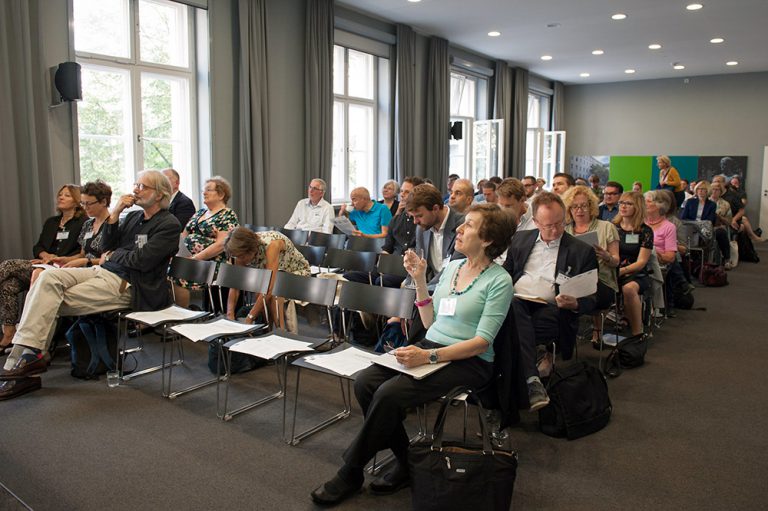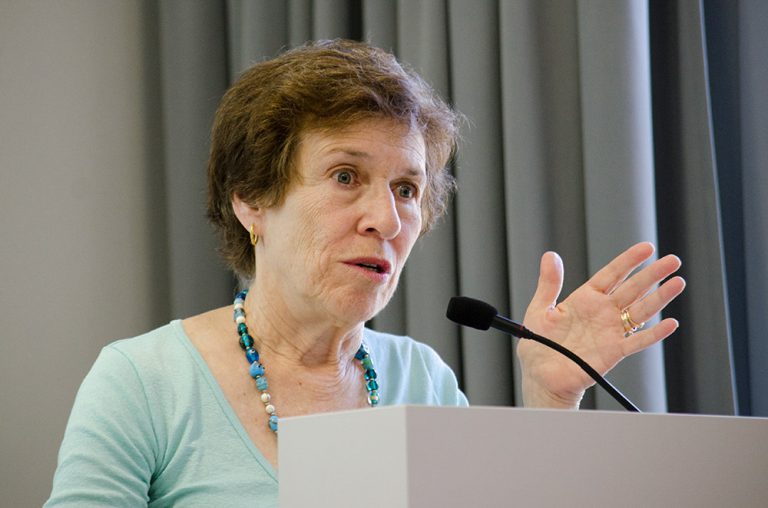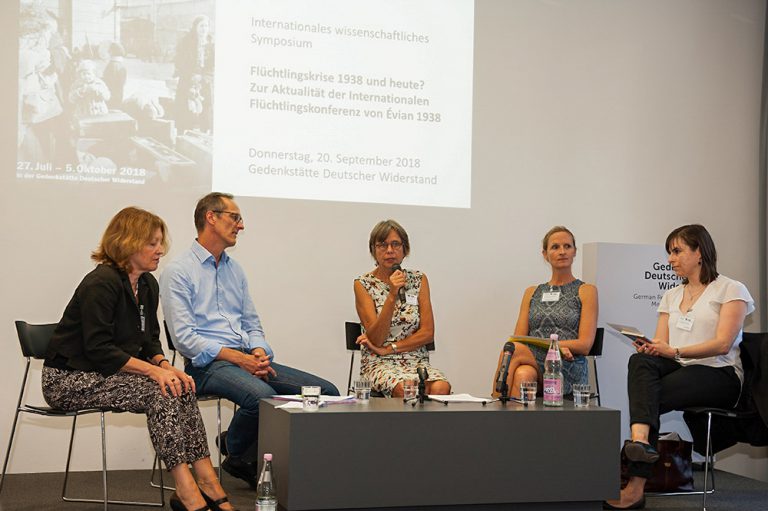Symposium
The exhibition was accompanied by an international academic symposium entitled “Refugee Crisis 1938 and Today,” held September 20, 2018 at the Gedenkstätte Deutscher Widerstand. International scholars addressed the after-effects of the Évian Conference in the most important participating countries, and its significance for the work of the United Nations High Commissioner for Refugees.
In the concluding panel discussion, historians and representatives of various refugees aid organizations discussed the relevance of the Èvian Conference today, including any lessons that may be drawn from the historical example.
The most important contributions to the international academic symposium, “Refugee Crisis 1938 and Today: On the Relevance of the Évian Conference” will be published in the Yearbook for Anti-Semitism Research, volume 28, in the autumn of 2019.

Symposium participants
(first row, l-r: Stefanie Schüler-Springorum, Miriam Rürup, Winfried Meyer, Marion Kaplan; second row, r-l: Wolf Gruner, Martin Jost)
Photo: Margrit Schmidt / Gedenkstätte Deutscher Widerstand
Symposium participants
(first row, l-r: Stefanie Schüler-Springorum, Miriam Rürup, Winfried Meyer, Marion Kaplan; second row, r-l: Wolf Gruner, Martin Jost)
Photo: Margrit Schmidt / Gedenkstätte Deutscher Widerstand

Marion Kaplan
In her talk about “‘The Americas’ and the Évian Conference,” Marion Kaplan reports about the Jewish settlement of Sosúa in the Dominican Republic.
Photo: Margrit Schmidt / Gedenkstätte Deutscher Widerstand
Marion Kaplan
In her talk about “‘The Americas’ and the Évian Conference,” Marion Kaplan reports about the Jewish settlement of Sosúa in the Dominican Republic.
Photo: Margrit Schmidt / Gedenkstätte Deutscher Widerstand

Discussion panel
In a discussion moderated by Susanne Heim (Institute for Contemporary History, Berlin) Stefanie Schüler-Springorum (Center for Research on Antisemitism/TU Berlin), Roland Bank (UNHCR Germany), Kerstin Düsch (Commissioner of German Bishops – Catholic Office in Berlin) and Franziska Vilmar (Amnesty International Germany) considered the relevance of the Évian Conference to the current state of refugee aid.
Photo: Margrit Schmidt / Gedenkstätte Deutscher Widerstand
Discussion panel
In a discussion moderated by Susanne Heim (Institute for Contemporary History, Berlin) Stefanie Schüler-Springorum (Center for Research on Antisemitism/TU Berlin), Roland Bank (UNHCR Germany), Kerstin Düsch (Commissioner of German Bishops – Catholic Office in Berlin) and Franziska Vilmar (Amnesty International Germany) considered the relevance of the Évian Conference to the current state of refugee aid.
Photo: Margrit Schmidt / Gedenkstätte Deutscher Widerstand
Internationales wissenschaftliches Symposium
Flüchtlingskrise 1938 und heute?
Zur Aktualität der Internationalen Flüchtlingskonferenz von Évian 1938
September 20, 2018
Gedenkstätte Deutscher Widerstand
Program
9.30 – 9.45 Uhr
Begrüßung: Stefanie Schüler-Springorum und Johannes Tuchel, Berlin
9.45 – 12.25 Uhr
Panel I (Moderation: Miriam Rürup, Hamburg)
- „The Americas“ and the Évian conference (Marion Kaplan, New York)
- Learning the Lessons of Évian: The Dominions and the Commonwealth, Then and Now (Paul Bartrop, Fort Myers FL)
- „Mission Bestseller“ – Hans Habes Roman „Die Mission“ und das öffentliche Bild der Évian-Konferenz in Deutschland (Winfried Meyer, Berlin)
13.40 – 16.15 Uhr
Panel II (Moderation: Stefanie Fischer, Berlin)
- Jüdische Organisationen in Évian (Martin Jost, Leipzig)
- Auswirkungen der Évian-Konferenz auf die NS-Judenpolitik im Jahre 1938 (Wolf Gruner, Los Angeles)
- Die Bedeutung der Évian-Konferenz für die Traditionsbildung und Arbeit des Hohen Flüchtlingskommissars der Vereinten Nationen (Roland Bank, Berlin)
17.00 – 18.30 Uhr
Podiumsdiskussion (Moderation: Susanne Heim, Berlin)
- Historischer Einzelfall oder warnendes geschichtliches Exempel?
Zur Aktualität der Flüchtlingskonferenz von Évian
mit Stefanie Schüler-Springorum (Zentrum für Antisemitismusforschung der Technischen Universität Berlin), Roland Bank (UNHCR Deutschland), Franziska Vilmar (Amnesty International Deutschland) und Kerstin Düsch (Kommissariat der Deutschen Bischöfe – Katholisches Büro in Berlin)
Moderation: Susanne Heim (Institut für Zeitgeschichte, Berlin)


